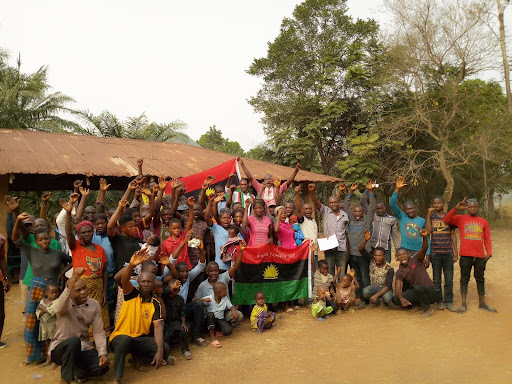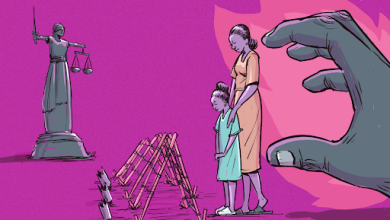
Aug. 22, 2021, was a Monday and a day for ‘sit-at-home’ in Southeast Nigeria. The forced weekly sit-at-home was decreed by the hierarchy of the separatist Indigenous People of Biafra (IPOB) across the states in the region.
Its forced observance is slated for Mondays of each week. The IPOB hierarchy announced the decree as ‘a show of support to our leader, Mazi Nnamdi Kanu, who is being illegally detained by Nigeria,’ one of its members, resident in Onitsha, Anambra State, told HumAngle early in August.
Following public criticism of a weekly 24-hour long suspension of all productive activity, including blocking school children scheduled for external examinations from sitting for their papers, IPOB through its spokesperson, Emma Powerful, released a statement that reviewed the earlier order.
The statement now called for observance of “no movement” by members of the public only on days that its leader Mazi Kanu’s case came up in courts. HumAngle has been closely monitoring the ideological fodder on which IPOB has been driving its activities.
On Aug. 22, weeks after the statement reviewing the weekly sit-at-home imposition, at least three people across Enugu and Imo states were beheaded by suspected elements within the fold of IPOB believed to be advancing and enforcing a more vicious and extremist ideology, allegedly for breaching their order.
In Enugu State, for instance, one Ifeanyi Orji, suspected to be a foot soldier for the group, ambushed a couple from a neighbouring Emudo Nenwe, in the Aninri Local Government Area (LGA). The couple was going to their farm when Orji accosted the duo and demanded to know why they did not observe the IPOB order, according to testimony by the victim’s wife. He proceeded to attack his victim with a machete, eventually beheading him.
Likewise, in Orlu, Imo State, two persons were beheaded by individuals believed to be members of IPOB. The victims had their severed heads placed by the marketplace. Orlu had in early August witnessed similar bizarre occurrence.
A resident who spoke with HumAngle suggested that the victims were perceived by IPOB members to be passing information intended to blow their cover to the Police. He reported that residents are living in fear and uncertainty.
Nothing in the past had brought to light the ideological war that had racked the hierarchy of the separatist group more than the fractured and separate positions held on the sit-at-home order.
With its centralised structure and singular authority under a ‘supreme’ leader, IPOB was not prepared for the sudden arrest of Kanu. Down the ranks, his word was law and no other person within the hierarchy of the group could get away with a position that contradicted what had been decreed by the ‘supreme’ leader.
The power structure within the IPOB hierarchy was dramatically dismantled at the twilight of 2020 following a major ideological rift between Kanu and his erstwhile second-in-command, Uche Mefor.
Kanu, in the course of his routine broadcasts on the group’s pirate radio, had made scathing remarks about the Catholic church. He said the Catholics were engaged in “fetish” worship, describing the church’s reverence of the crucifix and virgin Mary as acts of worshipping “graven images.”
Mefor, being a Catholic took it personally. Up until this time, the IPOB leadership structure presented Kanu as its leader, Mefor as the second-in-command, Uche Asigba, Emma Omesa, and Clifford Iloanya as trustees, with Iloanya adding the extra responsibility of the ‘Coordinator of Coordinators’ to his belt.
During his incarceration between 2016 and 2017, IPOB did not find it challenging to issue instructions across the board, unchallenged. Kanu abolished the position of ‘second-in-command’ and followed this immediately with the public launch of the Eastern Security Network (ESN), the combat militia arm of IPOB.
It served the purpose of deflating any attention on the Kanu-Mefor tussle. He pronounced himself a ‘supreme’ leader. Residents who spoke to HumAngle from several rural communities in the states of Southeast Nigeria attested to the popularity of the ESN among the people. Today, with ESN believed to be serving as the core of extremist non-state actors in the Southeast, it is doubtful if that popularity has not become short-lived.
With Kanu in incarceration and no established voice of authority to step in his shoes, commanders and foot soldiers drawn from the ESN have been giving the Biafra agitation their own ideological interpretations. Each Monday, they move as enforcers of their order across cities and communities in the southeastern region.
On Monday, Sept. 6, for instance, the outlaws ambushed a businessman identified as Simeon at Anike-Onicha in Ebonyi’s Ohaozara LGA and killed him together with his five staff. They were going to make a supply after he had enquired and was told that the sit-at-home order had been shelved.
The previous day, Fabian Eze, a driver was conveying goods from Nnewi in Anambra to Kabba in Kogi State, North-central Nigeria, but arrived Nsukka, in Enugu State, just before dawn the following day. He reportedly parked the truck a few kilometres from the entrance gate of the University of Nigeria, Nsukka, to wait out the day. Suspected ESN elements arrived at this location and set the vehicle and goods ablaze.
HumAngle’s close tracking of events within the group showed that IPOB had become radicalised by October last year. The killing of ESN’s famed field commander, Ikonso, by security forces last April may have further blown over the radicalising impact on the group, resulting in a frenzy of targeted attacks on police formations and military checkpoints in the second quarter of the year.
The extremist ideology, according to a source who is familiar with these developments, defines its target enemy more broadly to include those who may share the same aspirations with them but seem to disagree on the issue of strategy.
It is already feared that a faction of the ideologically extremist group may have morphed into a criminal variant currently whipping up an upsurge of violence in Aguleri, Anambra State. The Aguleri and Umuleri communities in the state have been traditional flashpoints of violence.
On Friday, Sept. 10, 2021, Alexander Edozieuno, the deposed Igwe of Mkpunando community in Aguleri was murdered in company of his driver, Chukwuemeka, by assailants suspected of extremist profile. The Igwe was deposed last year by Governor Willie Obiano of Anambra State following a controversial visit by a delegation of Igwes from the state to President Muhammadu Buhari, facilitated by Chief Arthur Eze, a billionaire businessman and strong Buhari supporter.
IPOB’s Biafran ideology currently seems unrecognisable compared to what it was at its inception when it devoted energy to public advocacy, and legal and diplomatic engagements to press its demand for a referendum. HumAngle spoke to an Igbo cultural and traditional authority, Chief Anayo Arinze, to seek insight into the occurrences.
He described what was happening in Igboland as an anathema. “The Igbos are tearing down what they built over the years. Do they wish to end up as embarrassing destitute without cover in their own land?” asked Arinze, who is also a cabinet member of the Awka traditional institution.
He observed that criminal elements have effectively wrested control of authority from within IPOB and have successfully used fear to control the people. The cultural historian said that what is going on currently in Igboland had never happened to the Igbos in its history as a nation.
He faulted the governors in the Southeast for letting the situation skid out of control, and suggested that it had become appropriate to declare a state of emergency in the zone as well as get military officers to run the states with a mandate to restore order.
Support Our Journalism
There are millions of ordinary people affected by conflict in Africa whose stories are missing in the mainstream media. HumAngle is determined to tell those challenging and under-reported stories, hoping that the people impacted by these conflicts will find the safety and security they deserve.
To ensure that we continue to provide public service coverage, we have a small favour to ask you. We want you to be part of our journalistic endeavour by contributing a token to us.
Your donation will further promote a robust, free, and independent media.
Donate HereStay Closer To The Stories That Matter




